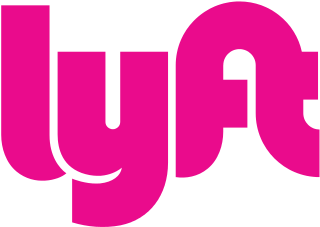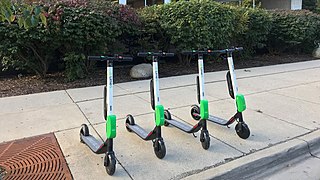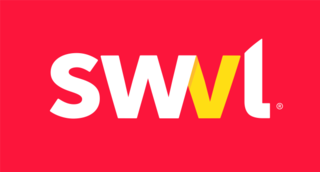Related Research Articles

Uber Technologies, Inc., commonly referred to as Uber, is a multinational transportation company that provides ride-hailing services, courier services, food delivery, and freight transport. It is headquartered in San Francisco, California, and operates in approximately 70 countries and 10,500 cities worldwide. It is the largest ridesharing company worldwide with over 150 million monthly active users and 6 million active drivers and couriers. It facilitates an average of 28 million trips per day and has facilitated 47 billion trips since its inception in 2010, after which it grew rapidly, becoming a financial unicorn and disrupting the taxicab business. In 2023, the company had a take rate of 28.7% for mobility services and 18.3% for food delivery.

Talpiot program is an elite Israeli Defense Forces (IDF) training program for recruits who have demonstrated outstanding academic ability in the sciences and leadership potential. Graduates pursue double higher education while they serve in the army, and they use their expertise to further IDF research and development in technological leadership positions. The program was inaugurated in 1979.

Lyft, Inc. is an American company offering mobility as a service, ride-hailing, vehicles for hire, motorized scooters, a bicycle-sharing system, rental cars, and food delivery in the United States and select cities in Canada. Lyft sets fares, which vary using a dynamic pricing model based on local supply and demand at the time of the booking and are quoted to the customer in advance, and receives a commission from each booking. Lyft is the second-largest ridesharing company in the United States after Uber.

Cornelia Isabella "Cori" Bargmann is an American neurobiologist. She is known for her work on the genetic and neural circuit mechanisms of behavior using C. elegans, particularly the mechanisms of olfaction in the worm. She has been elected to the National Academy of Sciences and had been a Howard Hughes Medical Institute investigator at UCSF and then Rockefeller University from 1995 to 2016. She was the Head of Science at the Chan Zuckerberg Initiative from 2016 to 2022. In 2012 she was awarded the $1 million Kavli Prize, and in 2013 the $3 million Breakthrough Prize in Life Sciences.

Anton is a massively parallel supercomputer designed and built by D. E. Shaw Research in New York, first running in 2008. It is a special-purpose system for molecular dynamics (MD) simulations of proteins and other biological macromolecules. An Anton machine consists of a substantial number of application-specific integrated circuits (ASICs), interconnected by a specialized high-speed, three-dimensional torus network.

Turo is an American peer-to-peer carsharing company based in San Francisco, United States. The company allows private car owners to rent out their vehicles via an online and mobile interface in five countries.

A ridesharing company, ride-hailing service, is a company that, via websites and mobile apps, matches passengers with drivers of vehicles for hire that, unlike taxis, cannot legally be hailed from the street.

In business, a unicorn is a startup company valued at over US$1 billion which is privately owned and not listed on a share market. The term was first published in 2013, coined by venture capitalist Aileen Lee, choosing the mythical animal to represent the statistical rarity of such successful ventures.

Grab Holdings Inc. is a Malaysian multinational technology company headquartered in One-North, Singapore. It is the developer of a super-app for ride-hailing, food delivery, and digital payments services on mobile devices that operates in Singapore, Malaysia, Cambodia, Indonesia, Myanmar, the Philippines, Thailand, and Vietnam.
A robotaxi, also known as robo-taxi, self-driving taxi or driverless taxi, is an autonomous car operated for a ridesharing company.

Bolt is an Estonian mobility company that offers ride-hailing, micromobility rental, food and grocery delivery, and carsharing services. The company is headquartered in Tallinn and operates in over 500 cities in more than 45 countries in Europe, Africa, Western Asia and Latin America. The company has more than 150 million customers and more than 3 million driver and courier partners. The company has plans for an initial public offering in 2025.
Careem is a Dubai-based super app with operations in over 100 cities, covering 12 countries across the Middle East, Africa, and South Asia regions. The company, which was valued at over US$2 billion in 2018, became a wholly-owned subsidiary of Uber after being acquired for $3.1 billion in January 2020. Careem expanded into the food delivery business with Careem Now in November 2018 and launched a digital payment platform, Careem Pay in April 2022. In April 2023, Careem's Super App business was spun out into a new legal entity, which e& acquired a 50.03% stake in, while Uber maintains full ownership of Careem's ride-hailing business.

Via Transportation, Inc. provides software as a service (SaaS) and mobility as a service to operators of public transportation, multimodal transport, paratransit operations in compliance with laws such as the Americans with Disabilities Act of 1990, non-emergency medical transportation, logistics and deliveries, school bus fleets, commercial ridesharing and corporate shuttles, and autonomous vehicles. Its customers include cities, transportation authorities, government entities, school districts, universities, and private organizations worldwide. It was founded in 2012 and is headquartered in New York City.
Snapp! is an Iranian vehicle for hire company, headquartered in Tehran that launched in February 2014. Users can request a ride via the iOS, Android, or web application, by indicating their location and destination. The price of the trip is set beforehand, to eliminate bargaining. Snapp! commissions drivers upon completing a background check, and showing a valid driver's license and insurance before hiring them.

Argo AI LLC was an autonomous driving technology company headquartered in Pittsburgh, Pennsylvania. The company was co-founded in 2016 by Bryan Salesky and Peter Rander, veterans of the Google and Uber automated driving programs. Argo AI was an independent company that built software, hardware, maps, and cloud-support infrastructure to power self-driving vehicles. Argo was mostly backed by Ford Motor Co. (2017) and the Volkswagen Group (2020).

Neutron Holdings, Inc., doing business under the name Lime, formerly LimeBike, is a transportation company based in San Francisco, California. It runs electric scooters, electric bikes and electric mopeds in various cities around the world. The system offers dockless vehicles that users find and unlock via a smartphone app that knows the location of available vehicles via GPS.

Bird Global, Inc. is a micromobility company based in Miami, Florida. Founded in September 2017, Bird has distributed electric scooters designed for short-term rental to over 400 cities.

A scooter-sharing system is a shared transport service in which electric motorized scooters are made available to use for short-term rentals. E-scooters are typically "dockless", meaning that they do not have a fixed home location and are dropped off and picked up from certain locations in the service area.

Flapper is a vehicle for hire company headquartered in Belo Horizonte, Brazil. Flapper operates a private aviation marketplace which provides per-seat bookings as well as whole aircraft charters.

Swvl is an Dubai-based provider of tech-enabled mass transit solutions, offering intercity, intracity, B2B and B2G transportation products and services. Swvl operates in 135 cities in 20 countries across Latin America, Europe, Africa and Asia. The company went public in March 2022 and is traded on the Nasdaq stock exchange under the ticker SWVL.
References
- ↑ "Scholars 2004". www.dandavidprize.org. Retrieved 2021-07-25.
- 1 2 Cremades, Alejandro. "This Entrepreneur Identified A Gap Left By Uber And Has Already Raised Over $450 Million". Forbes. Retrieved 2021-07-25.
- ↑ Rudgard, Olivia (2019-09-02). "Daniel Ramot: The man taking on Uber with ride-sharing for buses". The Telegraph. ISSN 0307-1235 . Retrieved 2021-07-25.
- ↑ Merced, Michael J. de la (2016-05-05). "Via Attracts Financing, Despite Silicon Valley's Nervousness About Ride Sharing". The New York Times. ISSN 0362-4331 . Retrieved 2021-07-25.
- ↑ Hu, Winnie (2017-11-05). "Want a Car Pool in Your Neighborhood? Via Says Vote for It". The New York Times. ISSN 0362-4331 . Retrieved 2021-07-25.
- ↑ Bromwich, Jonah Engel (2015-03-13). "Like Taking a Luxury Bus: Via, a Ride-Share App, Offers Manhattan Trips". The New York Times. ISSN 0362-4331 . Retrieved 2021-07-25.
- ↑ Hu, Winnie (2017-06-06). "New Yorkers Try a Startling Idea: Sharing Yellow Cabs". The New York Times. ISSN 0362-4331 . Retrieved 2021-07-25.
- ↑ Lombardo, Cara (2020-03-30). "WSJ News Exclusive | Exor Makes $200 Million Investment in Ride-Share Company Via". Wall Street Journal. ISSN 0099-9660 . Retrieved 2021-07-25.
- 1 2 Sylvers, Eric (2021-03-10). "Transportation Startup Via Makes $100 Million Bet on Mapping Company". Wall Street Journal. ISSN 0099-9660 . Retrieved 2021-07-25.
- ↑ "Daniel Ramot, Co-founder and CEO, Via". www.topionetworks.com. Retrieved 2021-07-25.
- ↑ "Israeli Via transport tech company acquires Remix mapping company". The Jerusalem Post | JPost.com. 15 March 2021. Retrieved 2021-08-15.
- ↑ Lee, Allen (2021-12-27). "10 Things You Didn't Know about Daniel Ramot". Money Inc. Retrieved 2023-06-27.
- ↑ "The Future of Global Ride-Hailing After Covid-19". The Information. Retrieved 2021-07-25.
- ↑ "CoMotion MIAMI LIVE". events.bizzabo.com. Retrieved 2021-07-25.
- ↑ "Mercedes-Benz's Enters European Ride-Sharing Market With Israeli Startup Via | Weizmann USA". American Committee for the Weizmann Institute of Science. 2017-09-04. Retrieved 2021-07-25.
- ↑ "Introducing Hearst Ventures' Newest Investment, Via - Introducing Hearst Ventures' Newest Investment, Via | Hearst". www.hearst.com. Retrieved 2021-07-25.
- ↑ "Big win for Israeli autotech as Mercedes owner forms joint venture, invests $50m". Haaretz. Retrieved 2021-07-25.
- ↑ "Daniel Ramot". BFHU. Retrieved 2021-07-25.
- ↑ "LEADERS Interview with Daniel Ramot, Co-Founder and CEO, Via". www.leadersmag.com. Retrieved 2021-07-25.
- ↑ "Daniel Ramot". Tech:NYC. Retrieved 2021-07-25.
- ↑ "D. Ramot". ieeexplore.ieee.org. Archived from the original on 2021-07-25. Retrieved 2021-07-25.
- ↑ Leichman, Abigail Klein (2016-02-18). "American commuters get a shared ride, courtesy of Israel". ISRAEL21c. Retrieved 2021-07-25.
- ↑ "100 of the most exciting startups in New York City". Business Insider. Retrieved 2021-07-25.
- ↑ Lee, Allen (2021-12-27). "10 Things You Didn't Know about Daniel Ramot". Money Inc. Retrieved 2023-06-27.
- ↑ Prize, Dan David. "Daniel Ramot". www.dandavidprize.org. Retrieved 2021-07-25.
- ↑ "D. E. Shaw Research company information, funding & investors". startup-map.berlin. Retrieved 2021-07-25.
- 1 2 "D.E.Shaw Research". www.deshawresearch.com. Archived from the original on 2008-09-18. Retrieved 2021-07-25.
- ↑ Alejandro Cremades (2019-03-19). "Daniel Ramot On Finding The Gap Left By Uber And Lyft And Raising Over $450 Million". Alejandro Cremades. Retrieved 2021-07-25.
- ↑ "New to D.C., ridesharing service Via wants to replace the Red Line during SafeTrack". Washington Post .
- ↑ "Interviews with the world's best entrepreneurs". British GQ. 2019-02-13. Retrieved 2023-01-24.
- ↑ "In an Uber and Lyft world, ride-sharing start-ups struggle to get off the ground". Washington Post .
- ↑ "Via Transportation CEO Ramot Sees Big Money in Buses: STYT". financialpost. Retrieved 2021-07-25.
- ↑ "Fixing Transit Is More Than Just Infrastructure". Bloomberg. 17 May 2021. Archived from the original on 2021-05-17. Retrieved 2021-07-25.
- ↑ "New York ride-sharing company raises $200M; now valued at $2.25B". www.bizjournals.com. Retrieved 2021-08-15.
- 1 2 "StackPath". www.masstransitmag.com. 10 September 2020. Retrieved 2021-07-25.
- ↑ "Hampton Roads Transit (HRT) awards Via with new paratransit services contract". Via Transportation. 2020-01-30. Retrieved 2021-07-25.
- ↑ Anzilotti, Eillie (2019-08-21). "New York City's school buses will now be automatically routed and tracked using Via's algorithm". Fast Company. Retrieved 2021-07-25.
- ↑ "On-demand shuttle startup Via hits $2.25 billion valuation on latest funding round led by Exor". TechCrunch. 31 March 2020. Retrieved 2021-07-25.
- ↑ "Shuttle Service Via Hits $2.25 Billion Value With New Funding". Bloomberg. 30 March 2020. Archived from the original on 2020-03-31. Retrieved 2021-07-25.
- ↑ Ramot, Daniel; MacInnis, Bronwyn L.; Goodman, Miriam B. (2008). "Bidirectional temperature-sensing by a single thermosensory neuron in C. elegans". Nature Neuroscience. 11 (8): 908–915. doi:10.1038/nn.2157. ISSN 1546-1726. PMC 2587641 . PMID 18660808.